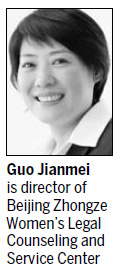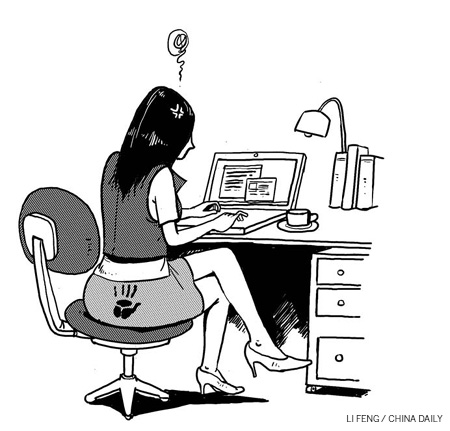View
The evil of sexual harassment
Updated: 2011-06-02 08:01
By Gao Zhuyuan (China Daily)

Sexual harassment is like a festering wound in society. A survey conducted by Women's Watch-China, a collaborative network and Beijing Zhongze Women's Legal Counseling and Service Center, showed that 23.9 percent of the employees who responded had heard of or seen colleagues suffer sexual harassment and 19.8 percent were sexually harassed, the majority of them women.
Women in China are more vulnerable to sexual harassment, because traditionally society has treated women as subordinates to men, and the situation is no different in workplaces, says Guo Jianmei, director of the center and one of China's leading public interest lawyers.
Besides, a woman is less likely to take legal action even if she is sexually harassed in her workplace, Guo says, citing a survey published in the 2009 Annual Report of Women's Watch-China. Women have a lot to worry about when it comes to reporting against sexual harassment. They have to think about their reputation - given the taboos that exist in society - the high cost of filing a lawsuit and ways to furnish evidence. To put it differently, "they generally lack confidence in getting legal protection".
The term "sexual harassment" entered the country's legal parlance in 1995, the year the United Nations' Fourth World Conference on Women was held in China, Guo says. It took another 10 years for it to become a legal term, for the Law of the People's Republic of China on the Protection of Rights and Interests of Women (Amendment) was approved only in 2005.
But the articles in the 2005 amendment are not enough to protect women against sexual harassment, because they don't describe sexual harassment in legal terms and are not specific on punishment measures, Guo says. Since the articles are hard to enforce, their legislative value is downgraded. Worse, the victims don't think they can defend their rights and interests through legal action.
Sexual harassment is back on the legislative agenda. The All-China Federation of Trade Unions is seeking revision of Regulations Concerning the Labor Protection of Female Staff and Workers, which the State Council enacted in 1988. The revised draft subjects employers to take necessary measures to curb sexual harassment in workplaces and provide employees with a healthy working environment.
But Guo says it is not certain when the revised regulation will be approved. "We are dedicated to facilitating sexual harassment legislation." Despite that there is uncertainty about how the article will be revised further.
The 2005 revised draft of the Law on the Protection of Rights and Interests of Women included a similar article but didn't survive. But some local governments like the one in Sichuan province have stipulated that employers are obliged to curb sexual harassment in workplaces. Still, the stipulations seem vague on how to handle sexual harassment complaints and lawsuits.
According to the articles in the 2005 amendment, victims of sexual harassment should have the right to file legal complaints or lawsuits. But if they decide against initiating legal action, they probably would have to quit their jobs to escape further sexual harassment. On the other hand, even if they take legal action, they face the risk - as most of the cases show - of losing the lawsuits because of the difficulty of providing evidence to support their accusations.
In the few cases that the victims win, the compensation is humble. And such is the social taboo attached to the victims that many of them are reluctant to return to their job and choose to look for employment elsewhere.
More often than not, the untold pain, and physical and psychological trauma that the victims, women in most cases, suffer are irreversible. That's why Guo and her colleagues attach great importance to prevention of sexual harassment, though they say that it is "equally important" that perpetrators get "proper punishment".
Guo has been working on a program aimed at strengthening anti-sexual harassment mechanisms in enterprises since 2007. The program, sponsored by the International Labour Organization, has helped establish anti-sexual harassment mechanisms in six enterprises across the country, ranging from manufacturing to service.
The anti-sexual harassment mechanism, Guo says, entails prevention and punishment measures that employers have to take as part of their corporate social responsibility. Most importantly, each employee should be treated as a legally protected unit and have access to a healthy working environment free of sexual harassment.
Combining overseas experiences with the situation in the country, Guo and her colleagues came up with a handbook in late 2010 to share their hard-gained experience of setting up anti-sexual harassment mechanisms in enterprises.
To establish an anti-sexual harassment mechanism, the handbook says, employers should first draw regulations on sexual harassment, and then form a special team to handle sexual harassment cases.
Investigations should begin as soon as a complaint is lodged, and the punishment should be specified, such as demotion, wage cut and even layoff. It is important to respect the privacy of the complainant and take follow-up measures to prevent perpetrators from harming the victims or witnesses.
From ordinary to management staff members, every employee should be informed regularly about what constitutes sexual harassment and the result of such behavior on their career. Plus, employees should be taught how to prevent and respond to sexual harassment.
Guo says it is not possible to give a detailed list of what employers should do to prevent sexual harassment. But it is important to know that such a mechanism is not only for female workers, but also male workers. And sexual harassment cases can be registered against workers of the opposite sex as well as the same sex.
Should a worker fall victim to sexual harassment, she/he should remember to collect and preserve the evidence. More importantly, she/he should have zero tolerance toward sexual harassment and bravely initiate legal action, which, irrespective of its success, can propel the country's legislative process to a certain degree, Guo says.

Specials

China Daily marks 30th birthday
China's national English language newspaper aims for a top-notch international all-media group.

Room at the inn
The Chinese hotel industry experiences a building boom, prompting fears of oversupply.

Pearls of wisdom
Chinese pearl farmers dominate the world market but now want to work smarter, not harder